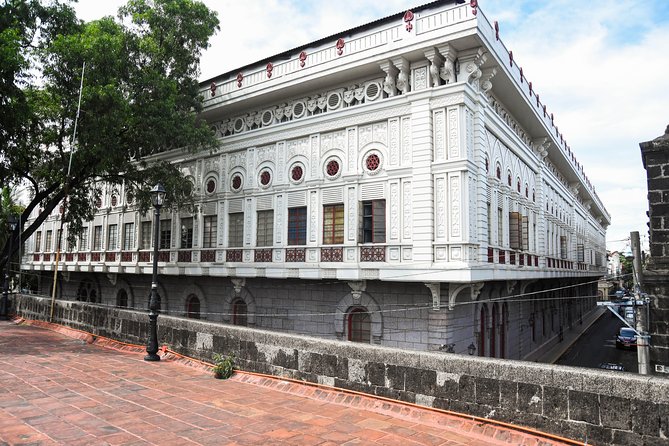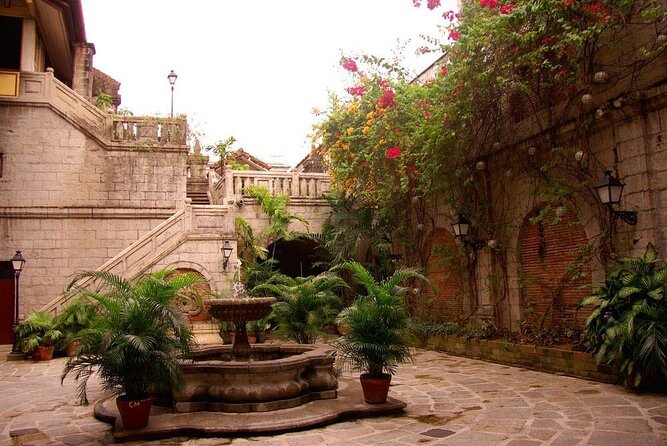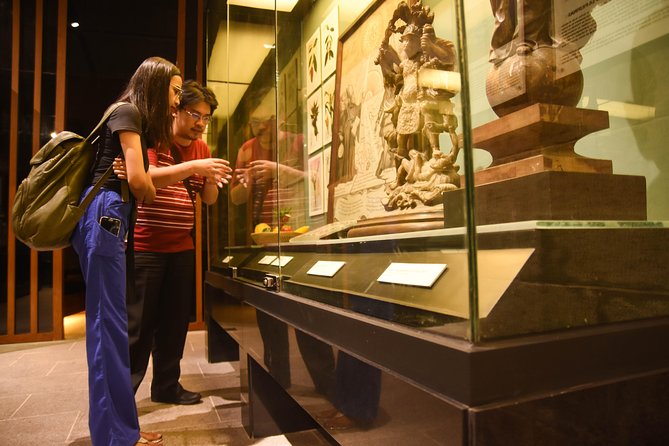The Philippines’ history is a captivating tapestry, woven with the influence of diverse cultures and colonial powers. From the pre-colonial era to the Spanish colonial period, the country’s narrative is a testament to cultural exchange, resistance, and the emergence of a unique national identity. Visitors can explore this rich heritage through the architectural wonders, religious institutions, and historical sites that dot the landscape, offering a window into the Philippines’ complex and fascinating past. What secrets do these historic landmarks hold, and how did they shape the modern nation we know today?
Key Points
- The Philippines has a rich history dating back to the 16th century, when it was a Spanish colonial territory for over 300 years.
- Intramuros, the fortified settlement in Manila, served as the seat of Spanish colonial power and reflects the enduring Spanish influence on Philippine culture.
- Iconic structures like the San Agustin Church and the Manila Cathedral showcase the blend of Spanish colonial and Filipino architectural styles.
- The Casa Manila museum provides a captivating glimpse into the opulent lifestyle of the 19th-century Filipino elite under Spanish colonial rule.
- Fort Santiago, a military stronghold during the colonial era, is now a revered site that honors the life and legacy of the national hero, Dr. Jose Rizal.
Historical Significance of Intramuros

Intramuros, the historic walled city of Manila, stands as a testament to the Philippines’ Spanish colonial heritage, serving as the epicenter of the nation’s early development.
This 16th-century fortified settlement was the seat of Spanish colonial power, housing the residence of the Governor-General, religious institutions, and elite neighborhoods.
Within its walls, one can find iconic structures like the San Agustin Church, the oldest stone church in the country.
Intramuros’ strategic location and architectural design reflect the Spanish influence that shaped the Philippines’ social, political, and cultural landscape for centuries.
Today, this vibrant historic district offers visitors a glimpse into the country’s complex past.
Fascinated by Manila's past? More historical tours we've covered
San Agustin Church and Museum

The San Agustin Church and Museum stands as one of the most iconic landmarks within Intramuros, showcasing the Spanish colonial architectural influences that have shaped the Philippines’ religious and cultural heritage.
Visitors can explore the church’s magnificent interiors, adorned with intricate carvings, gilded altars, and centuries-old paintings.
The adjacent museum houses a rich collection of religious artifacts, including vestments, chalices, and other liturgical items.
Highlights of the museum include:
- The 17th-century baroque pipe organ, considered one of the oldest in Asia.
- The Sacristy, featuring exquisite wood carvings and religious relics.
- The Augustinian Library, boasting a vast collection of ancient manuscripts and books.
Architectural Gem of Casa Manila
Located within the historic Intramuros district, Casa Manila stands as an architectural gem that showcases the Spanish colonial influence on Filipino design and culture. Boasting intricate woodcarvings, ornate furnishings, and a meticulously restored interior, the museum offers visitors a glimpse into the opulent lifestyle of the 19th-century Filipino elite.
As guests explore the museum, they’re transported back in time, surrounded by the grandeur of a bygone era. The museum’s exhibits provide a captivating look at the social and cultural dynamics of the colonial period, highlighting the blend of Spanish and Filipino elements that shaped the country’s unique identity.
| Feature | Description |
|---|---|
| Woodcarvings | Intricate and ornate |
| Furnishings | Opulent and reflective of 19th-century elite lifestyle |
| Restoration | Meticulous attention to detail |
| Exhibits | Showcase social and cultural dynamics of the colonial period |
| Atmosphere | Transports visitors back in time |
Grandeur of Manila Cathedral

Towering majestically within Intramuros, Manila Cathedral captivates visitors with its grand neo-Romanesque architecture and rich ecclesiastical heritage.
Constructed over several centuries, the cathedral’s facade and interiors showcase the evolution of Philippine religious art and design, blending Spanish colonial influences with distinctive Filipino motifs.
The cathedral’s highlights include:
-
The impressive granite facade with its twin bell towers, carved arches, and intricate religious statues.
-
The ornate interior with its gilded altar, vaulted ceilings, and colorful stained glass windows.
-
The adjacent Baroque-style Baptistry, which houses the cathedral’s baptismal font and religious artifacts.
These elements combine to create a breathtaking spiritual and architectural experience for all who visit Manila Cathedral.
Exploring the Walls of Fort Santiago
Nestled within the historic Intramuros district, Fort Santiago captivates visitors with its impressive stone walls and rich tapestry of Philippine history. Constructed by the Spanish in the 16th century, this iconic fortress served as a military stronghold, a political prison, and a revered site of national significance.
As part of the tour, guests can explore the fort’s various landmarks, including:
| Landmark | Significance |
|---|---|
| Rizal Shrine | Honors the life and legacy of Dr. Jose Rizal, a national hero |
| Dungeons | Once held political prisoners, including Rizal before his execution |
| Plaza de Armas | The main parade ground where military drills were conducted |
Strolling along the fortress walls provides a glimpse into the country’s tumultuous past and the resilience of the Filipino people.
- Manila Food Tour: Introduction to Philippine Street Food
- Discover Tagaytays Countryside: Half-Day Sightseeing Tour
- Experience Intramuros With Bamboo Bicycle – Ecotours
- Manila Food Tour: Explore Worlds Oldest Chinatown
- Spectacular Manila to Tagaytay: Full-Day Sightseeing Tour
- Pagsanjan Falls-Taal Volcano-Tagaytay Ultimate Day Tour From MNL
Spanish Colonial Influence on Manila
The Spanish colonial era left an indelible mark on Manila, shaping the city’s architectural landscape and cultural identity through the construction of grand cathedrals, fortifications, and administrative buildings.
Among the most prominent examples of this influence are:
The Manila Cathedral, a magnificent Catholic church that showcases a blend of Baroque and Neo-Classical styles, reflecting the Spanish religious and architectural dominance.
The imposing walls of Intramuros, a walled city that served as the political and administrative heart of the Spanish colonial regime, protecting the colonizers and their interests.
Casa Manila, a restored 19th-century residential dwelling that provides a glimpse into the lifestyle and opulence of the Spanish elite who once occupied the city.
Highlights of the Small Group Tour
The small group tour of Manila’s historic Intramuros district provides visitors an intimate glimpse into the city’s Spanish colonial legacy.
Guests explore the iconic San Agustin Church and Museum, marveling at its Baroque architecture and religious artwork.
They then venture to Casa Manila, a meticulously restored 19th-century residence that transports them back in time to experience the lavish lifestyle of the Spanish elite.
The tour also includes a visit to the Manila Cathedral, a magnificent stone structure that has witnessed the city’s tumultuous history.
The final stop is Fort Santiago, a historic fortress that offers panoramic views of the Pasig River.
Throughout the tour, participants gain a deeper understanding of the Philippines’ rich cultural heritage.
Practical Tour Information
The tour begins at the San Agustin Church lobby in Intramuros, Manila, where you will gather.
Throughout the half-day experience, the group size is limited to 10 people, ensuring an intimate and personalized tour.
At the end of the tour, guests will finish at the historic Fort Santiago, also located in Intramuros.
The tour includes:
- Bottled water to stay hydrated.
- All entrance fees, so guests don’t have to worry about paying on the spot.
- Gratuities, ensuring a hassle-free experience.
This small group tour provides an in-depth introduction to Philippine history, with a focus on the Spanish colonial influence and Filipino heritage within the historic Intramuros district.
Frequently Asked Questions
What Is the Attire Recommended for the Tour?
The tour organizers recommend casual, comfortable clothing and walking shoes. Visitors should dress appropriately for the outdoor exploration and expect to do a fair amount of walking during the half-day tour.
Can the Tour Be Customized for Individual Preferences?
The tour can be customized to individual preferences. While the standard itinerary covers the key historic sites, the tour guide can adjust activities and pace to suit guests’ interests and needs within the half-day timeframe.
Are There Any Age Restrictions for Participants?
There are no age restrictions for this tour. Participants of all ages are welcome to join. The tour is designed to accommodate a range of interests and fitness levels within the small group size.
Are There Any Options for Private or Family Tours?
There are private tour options available for those who prefer a more intimate experience. Families can arrange a private tour to explore the historic sites at their own pace with a dedicated guide.
Can the Tour Be Combined With Other Activities in Manila?
The tour can be combined with other activities in Manila, such as exploring nearby museums, visiting local markets, or experiencing the city’s vibrant food scene. This allows for a more comprehensive exploration of the destination.
Recap
The Philippines’ rich historical heritage is evident in the architectural treasures of Intramuros.
From the grand Manila Cathedral to the intimate Casa Manila, this guided tour offers a captivating glimpse into the country’s Spanish colonial past.
Exploring the storied walls of Fort Santiago and the serene San Agustin Church, visitors can enjoy the Philippines’ complex and fascinating history, gaining a deeper appreciation for its diverse cultural legacy.
More Historical Tours in Manila
More Tour Reviews in Manila
- Cavite Celebration and Freedom Package Review
- Round-trip Coron Airport Transfer + Town Tour (Shared)
- Hidden Valley Springs With Lunch From Manila
- 8 Days North Luzon Private Tour Review
- Try Find Your Better Than Us ! Airport Transfer Service in Manila HTL-APT (Mnl)
- Private Half-Day Shore Excursion Old Manila
Not for you? Here's more things to do in Manila we have recnetly reviewed
- 3 Best Dining Experiences In Manila
- 2 Best Dinner Tours In Manila
- 5 Best Shopping Tours In Manila
- 5 Best 3 Day Tours In Manila
- 2 Best Lunch Experiences In Manila
- 13 Best Food Tours In Manila
- Nasugbu 3 Peaks Day Hike From Manila
- Mt. Talamitam Adventure: a Day of Scenic Hiking From Manila
- Practice Yoga & Qi Gong in Nature Review
- Shared Hidden Valley Tour From Manila Review
- Tagaytay + Hidden Valley Springs: a Scenic Escape W/ Transfers
- Mt. Talamitam Adventure: a Day of Scenic Hiking From Manila
